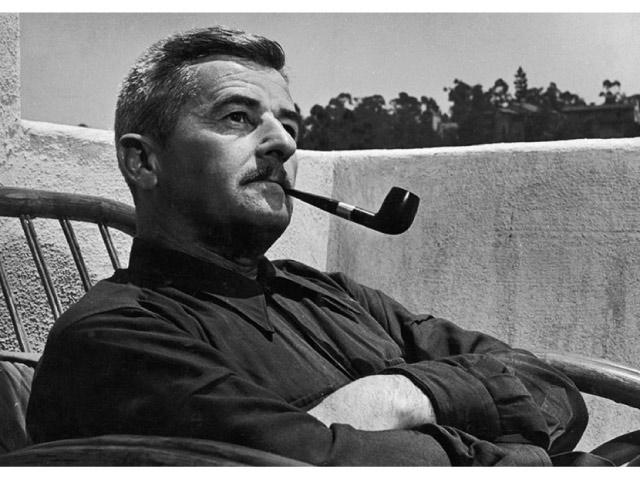I. Faulkner: his life
Faulkner came from a family that originated in the South and was deeply rooted in the culture and history of that region. Growing up in the South and his experience living in Mississippi profoundly influenced his literary work, allowing him to capture the essence of this complex and often troubled society. In addition, he studied for a while at the University of Mississippi, before abandoning his studies to join the Canadian Air Force during the First World War. After the war ended, Faulkner would return to live in Mississippi, working as a writer while working different jobs to support himself. His lifestyle has allowed him to develop a unique writing style, notably characterized by complex narratives, bold stylistic experiments and a deep exploration of human psychologies. Faulkner often used a non-linear narrative structure to explore themes of guilt, memory, family legacy, and social decay.
Faulkner created a complex fictional universe, the imaginary county of Yoknapatawpha , where most of his novels and short stories take place. His mastery of storytelling, bold use of time, and deeply nuanced characters earned Faulkner the Nobel Prize for Literature in 1949. However, behind his literary successes, Faulkner's personal life was often tumultuous. He struggled with alcoholism, financial difficulties, and complicated relationships. Despite these challenges, his dedication to his art persisted, producing a rich and influential body of work.
II. Faulkner and his works
Faulkner is a writer who has greatly influenced modern literature and many contemporary writers through his innovative writing style and his stories deeply rooted in the American South. He is particularly known for his complex prose, his innovative use of storytelling, and his ability to explore the psychology of his characters in deep and nuanced ways. His literary legacy continues today.
Faulkner saw his first work, a novel called " Soldiers ' Pay ", published in 1926. However, it would be with "The Sound and the Fury" published in 1929 that he gained critical fame. Faulkner is also known for his profound exploration of themes of Southern decadence, morality, guilt, and the complexity of human relationships.
Among his best-known works, we can note "Sanctuary" (1931), "While I'm Dying" (1930), "Absalom, Absalom!" (1936), “The Intruder” (1948), and “The Sound and the Fury” (1929). He received the Nobel Prize for Literature in 1949 for his entire body of work, recognizing his contribution to contemporary literature with writings marked by powerful artistic originality. William Faulkner wrote numerous novels, short stories and essays during his writing career, in addition to the more famous works named above. Among the novels, we find "Light of August" (1932), "Pylon" (1935), "The Wild Palms" (1939), " Intruder in the Dust " (1948), "A Case of Conscience" (1951 ), “The Summer Before the Fall” (1959). He also wrote three collections of short stories: “Ces thirteen” (1931), “Horses in the night” (1933), “All the news” (1950).
Faulkner also wrote poems (One of his best-known poems is "A Green Bough " (1940).), plays and essays throughout his career. His experimental novels and complex narrative style helped establish his reputation as a major writer of the 20th century. Faulkner did indeed attempt to write plays, but they did not enjoy the same success as his novels and short stories. One of his best-known plays is "Requiem for a Nun ", which premiered in 1959. However, it is important to note that this play is closely related to his previous novel, "The Sound and the Fury ", and can be considered a theatrical extension of his romantic work.
In conclusion, it turns out that The Biography of William Faulkner reveals a complex portrait of one of the most important writers of the 20th century. His impact on American literature remains undeniable, and his works continue to be studied and celebrated for their complexity, depth, and contribution to the understanding of the human soul. Faulkner remains a literary titan whose legacy endures beyond his time.










